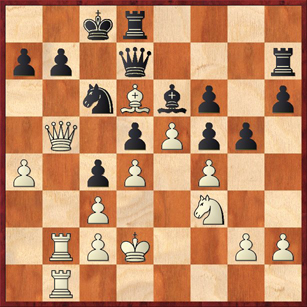This weekend I played in the curiously named Adults Open in San Jose, the first NC-17 rated chess tournament. No, there was no hanky-panky going on. It’s just that tournament director Salman Azhar thought that some grownups might be more interested in a weekend chess tournament with no kids around to (a) make lots of noise and (b) steal their rating points. Actually, I think that (b) is the biggest problem! Especially in the Bay Area, there are so many underrated, up-and-coming youngsters. The 1600 players play more like 1900 players, and some of the 1900 players are already expert or master strength.
With no one under 17 allowed, the tournament had a rather small turnout: eight people in the over-1800 section, and twelve people (I think) in the under-1800. The top section was won by Karim Seada, who had 3½ points out of 4. I finished second with 3 out of 4. I lost to Seada in our matchup in round two. I lost a pawn in the middlegame, but fought back nicely in the endgame and got to a completely drawn position. Then I had a hallucination and thought I was winning, but my “winning combination” turned out to be a winning combination for my opponent instead. Darn it. If I had just held onto the draw, I would have won the tournament and Seada would have been second.
However, I can’t really complain too much. All of my wins came as a result of rather severe blunders by my opponents, one in a position that was certainly a draw and another in a position that was complicated and unclear. In “karma points,” I think that 3 out of 4 was a reasonable reflection of the way I played.
I’ve got to show you one game from the tournament, but it isn’t mine. One of the people who played in the top section was Theo Biyiasis, the son of grandmaster Peter Biyiasis, a former Canadian champion who is now retired from tournament chess. Theo says that he has only been playing chess seriously for the last year. It’s interesting that he has taken it up so late (I’m guessing that he is about 19 or 20 years old, though I didn’t ask him). Apparently, in this case, the famous father did not put any pressure on his son to follow in his footsteps.
Anyway, Theo scored a very respectable 2-2 in the over-1800 section, with losses to me and Seada, and the following spectacular win. The PGN is here.
Theo Biyiasis — Terry Nelson
French Defense
1. e4 e6 2. d4 d5 3. Nc3 Bb4 4. e5 c5 5. a3 Bxc3+ 6. bc Ne7 7. f4 …
A little used sideline, but I don’t really see anything wrong with it.
7. … Nbc6 8. Nf3 Nf5 9. Bd3 c4 10. Bxf5 ef 11. a4 Be6?
Black should castle kingside. I think that most strong players would consider it suicidal for Black to castle queenside here. However, saying this is one thing and proving it is another. From this point on, Theo plays the attack clearly and convincingly for White.
12. Ba3 Qa5 13. Kd2! O-O-O 14. Qb1 h6 15. Qb5 Qc7 16. Bd6 Qd7 17. Rab1 f6 18. Rb2 g5 19. Rhb1 Rh7
White to move.
Can you see how Theo finished off the game? It seems as if Black has managed to defend his queenside by the clever maneuver … f6, … g5, and … Rh7. But Theo said, “I had so much material over there that I just felt as if there ought to be something.” And, sure enough, he found a pretty good “something.”
See it yet?
The answer is:
20. Qa6!! and Black resigned. The queen sacrifice breaks down Black’s position. If 20. … ba 21. Rb8+ Nxb8 22. Rxb8 mate. If 20. … Nb1 21. Qxa7 and White is still threatening mate in one. If Black plays some other random move, then White is going to play 21. Rxb7 Qxb7 22. Rxb7 Rxb7 Qxc6+ followed by mate.
A very pure queen sacrifice, where White’s pieces work together just like clockwork. Bravo, Theo!




{ 1 comment… read it below or add one }
Beautiful!